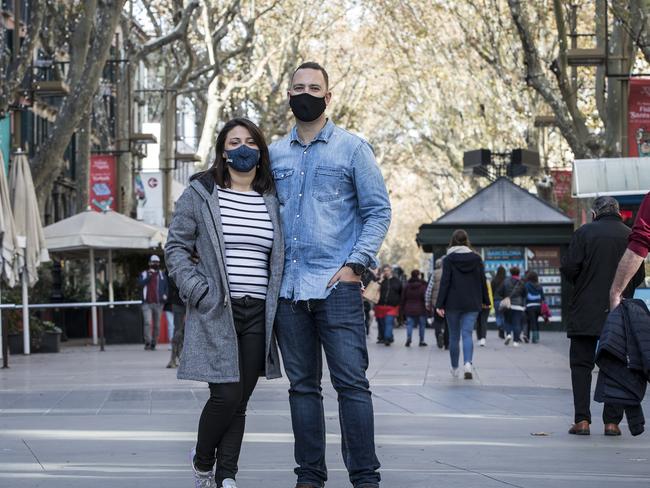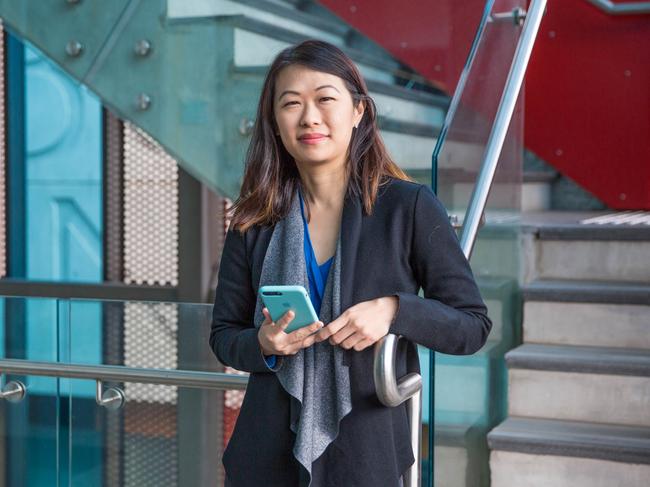Loneliness epidemic driving up depression, anxiety rates, experts say
Melbourne man Nathan Webb has opened up about his feelings of loneliness while trapped overseas, as experts call for a new approach to address the epidemic.
News
Don't miss out on the headlines from News. Followed categories will be added to My News.
Australia is facing a hidden epidemic of loneliness, which is driving up rates of depression and anxiety and causing people to die years before they should.
With hundreds of thousands of people feeling desperately alone, researchers and mental health professionals are sharpening their focus on the negative effects of loneliness, which have been magnified by the COVID-19 lockdowns across Australia.
Experts say loneliness can be as bad for your health as smoking, and that people can literally die from it.
Yet health campaigns which seek to improve people’s mental and physical health by boosting their social connections remain ad hoc.
This is despite an Australian Psychology Society study in 2018 which found one in four Australians feel lonely on three or more days every week.
A researcher who specialises in social connection, Professor Alex Haslam, said loneliness was increasingly being put on the radar of researchers and health professionals.
“You only have to go back two or three years and nobody was talking about this at all,’’ Prof Haslam told News Corp.
“The zeitgeist is changing, the public consciousness is changing and I think that’s really important.”

A Professor of Psychology and Australian Laureate Fellow in the School of Psychology at the University of Queensland, Prof Haslam said a lonely person would, generally speaking, “not be in a good space.’’
“The evidence bears that out. Often there will be particular reasons for that. That can be life events, life transitions. If you move to a new town or you lose your job or you’re a fly-in fly-out worker,’’ he said.
“Often those people will feel very marginalised. Loneliness will be one aspect of their experience but there’s other things too. They will be likely to be struggling in lots of different ways.
“Loneliness is a bit of a gateway to lots of other things. Depression and anxiety are very highly correlated.
“Disease and illness thrive on loneliness in interesting ways. Physically you’re not in the best state and your body is not in the best state to deal with the world and all the challenges it presents, whether those are physiological or psychological.’’

Prof Haslam said he believed people could die as a result of their loneliness.
“I think so. It’s not what it’s going to say on their death certificate, it’s going to say other things like their immune system doesn’t work so well.
“If you’re lonely and that’s correlated with being alone, you’re going to lack social support. If you’re lonely and on your own, other people aren’t going to help you when you need help.
“They’re not going to take you to the hospital, that’s one thing. But they’re also not going to say ‘hey mate, I think you’d better go for a check-up’, or ‘are you doing okay’, those sorts of things which are actually immensely important.
“Some of those things are material, like getting your shopping done, but they’re also psychological, ‘I’m not alone here with the problems and challenges’.’’
Academic and clinical psychologist Michelle Lim said loneliness was not restricted to any single societal group and could be felt by anyone.
Dr Lim, the scientific chair of the new peak body Ending Loneliness Together, also said people with lower socio-economic status were disproportionately affected.
“We know that loneliness is an increasingly common complaint in developed countries like the UK, the USA and Australia,’’ she told News Corp.
“It’s not just your older person in a nursing home who experiences loneliness, it’s the young doctor working in a hospital. There are significant complexities.’’

Dr Lim is a senior lecturer in clinical psychology at Swinburne University of Technology in Melbourne and has examined programs aimed to connect with isolated people.
A new white paper has been released by Ending Loneliness Together examining how Australia should respond to loneliness from a policy point of view.
She said sometimes a lonely person saw a different volunteer every time they were paid a visit, making it impossible to build a meaningful connection.
“Mrs Jones sees a different volunteer every single time. How does that make Mrs Jones feel? She’s always on the receiving end. Everyone knows something about her but she doesn’t know anything about that person,’’ Dr Lim said.
“These sorts of programs, you know what the (key performance indicator) sometimes is? One minute. What can you achieve in one minute?’’
American academic Julianne Holt-Lundstad’s seminal research paper Social Relationships and Mortality Risk, published in 2010, first established that loneliness was as dangerous to a person’s health as smoking 15 cigarettes a day.
“These findings indicate that the influence of social relationships on the risk of death are comparable with well-established risk factors for mortality such as smoking and alcohol consumption and exceed the influence of other risk factors such as physical inactivity and obesity,’’ the study, which reviewed 148 global health and wellbeing studied, found.
MELBOURNE MAN SEPARATED FROM FAMILY FOR THREE YEARS
As the Webb family emerged from Melbourne’s 112-day lockdown and began making plans to reunite, another member of the family was entering a second lockdown.
Nathan Webb, 31, one of five siblings, is still trapped in Barcelona, Spain, unable to get a flight back to Australia.
He has now gone three years without seeing all his family together.
“It’s definitely been quite a challenge,’’ he told News Corp.
“Being able to see the family again would have been something that would have been very important to me.
“It does create some small issues every now and again because you’re in a totally different culture and environment, things are very different here as compared to Australia, not having the family nearby makes a big difference.’’
Back in Melbourne, older brother Jason, 35, was also feeling the distance – not just with his brother 16,000kms away, but with his family in Melbourne.
His wife, a nurse, contracted coronavirus at the height of Victoria’s second wave, and the pair were confined to their home for 19 days, unable to see anyone including their three young children.

Jason said the pair felt lonely and isolated, and missed both their families during the lockdown, particularly during the weeks when his wife was ill.
“Physically I certainly did (feel lonely),’’ he said.
“I felt very detached, not only from my wife, who I couldn’t hug for comfort, but very much so from my children.’’
The Webb family’s experience is emblematic of everyone in Australia who experienced a hard lockdown in 2020, none more so than the five million residents in Melbourne.
A mental health social worker, Jason Webb had the training and experience to deal with the lockdown, and said the couple drew on their Christian faith, and the support of their two families and friends.
“I know if you don’t have that support around you, you would be horribly isolated and depressed, very low mood, you would probably very quickly lose hope, not having that sort of regular social interaction and support,’’ he said.
The family – siblings Rosemary, 33, Alister, 27, Josiah, 21, and parents Jeff and Delwyn -stayed in touch by video calls and weekly calls to Nathan in Barcelona.
Nathan, who works in online customer support for the Levis company, said he had booked tickets home for April last year, but was unable to make the flight after the borders closed.
He has since been unable to get a flight back to Australia.
“I tried taking a look at some options but it really is beyond the reach of an average person unfortunately,’’ he said.
PARLIAMENTARY COMMITTEE TO FIGHT LONELINESS
A bipartisan political group has been established in Canberra to raise awareness of the loneliness crisis, and help drive policies to tackle it.
The Parliamentary Friends for Ending Loneliness launched late last year, chaired by Victorian Labor MP Andrew Giles and NSW Liberal MP Fiona Martin.
The pair said the group would work to raise the profile of the loneliness epidemic and reduce the social and economic harm it causes.
Mr Giles said loneliness needed to be talked about in a political and policy sense.
“We know that loneliness is bad for your health, in fact we know loneliness can kill,’’ he said.
“There’s still a big stigma attached to loneliness. It’s something that impacts people’s lives but people often don’t feel they can talk about it, the significance it has for them.
“My hope is that through the work of this group, supporting great organisations and researchers we can do with this issue what’s been done for an issue like mental health perhaps 30 years ago when it wasn’t treated as seriously as it should have been.’’
Mr Giles said a debate could be held on whether state or federal governments ought to appoint a loneliness minister, as the UK government has done, to ensure policies tackling loneliness were developed alongside other health, social and economic policies. Another option was to create a bureaucratic structure with responsibility for it.

“If this is sufficiently concerning as a public health question in the UK why aren’t we talking about it in Australia?’’ he asked.
“That’s what I am determined to try to work towards with this Parliamentary friendship group. I think there will probably be some political differences in terms of how we respond to loneliness. But I think Fiona and I will be in agreement that the first thing we’ve got to do is make sure this is an issue that’s discussed when we talk about the policy challenges that face our country.’’
Dr Martin, a psychologist, said it was important to educate community organisations and health practitioners to better identify, assess and treat those experiencing loneliness.
“Loneliness is associated with numerous physical and mental health conditions and is one of the biggest public health issues of our time,’’ she said.
“Like many public health issues, early intervention and prevention is an important way to reduce the prevalence of loneliness in our communities.
“That’s why I support an evidence-based approach to tackling loneliness in children and adolescents to ensure young people will have the skills they need to feel more engaged and truly connected. This will ultimately help reduce the economic and human costs of loneliness in our society.’’
She did not express a view on whether a loneliness minister ought to be appointed, saying it was “best addressed through the health and mental health portfolios so that it can be comprehensively integrated into existing policies.’’
HOW OTHER COUNTRIES ARE TACKLING LONELINESS
Strategies to tackle loneliness are being developed by governments overseas, with Canada’s latest official healthy eating guide encouraging people to eat together, and the United Kingdom appointing the world’s first Loneliness Minister.
Former UK prime minister Theresa May launched the first cross-government strategy to tackle the scourge in 2018, declaring “loneliness is one of the greatest public health challenges of our time.’’
The strategy was developed as a result of the work done by MP Jo Cox, who developed a nonpartisan Loneliness Commission just before she was murdered by a constituent in 2016.
By 2023, all general practitioners in the UK will be able to refer patients experiencing loneliness to community activities and voluntary services such as cooking classes, walking clubs and art groups. Community workers will offer tailored support to help improve their health and wellbeing, under a practice known as “social prescribing.’’
Ms May said UK general practitioners had reported seeing between one and five patients every day who suffered from loneliness, which contributed to heart disease, strokes and Alzheimer’s.
According to UK Government statistics, around 200,000 older people reported not having had a conversation with a friend or relative for more than a month.
Further, the Royal Mail will have its posties check in on isolated people while on their mail runs, to see if they could help link them up to families or community organisations.
In January 2019 the Canadian government updated its official healthy eating guide, including for the first time a recommendation that people eat with others.
The guide said that eating with family, friends, neighbours or co-workers helped contribute to a healthy lifestyle.
It made people more aware of what they were eating, and was a useful opportunity to connect.
The Canadian Government guidelines also noted that helping seniors eat in company could help them eat more, which was important for better nutrition in the elderly.
“Seniors often tend to eat alone. This can result in a sense of isolation and feelings of loneliness, especially at mealtimes,’’ the guidelines state.
“These feelings, along with other changes you may experience as you age, can result in a loss of appetite. Eating less can impact your intake of important nutrients.’’




